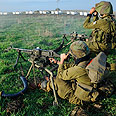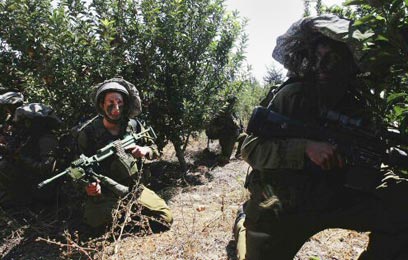
IDF says calm on Syria border 'deceptive'
Military sources say escalating civil war in Syria, anti-Israel aggression fostered by Assad, increase likelihood of terror attack on what has essentially been Israel's most tranquil border thus far
Despite the alleged strike against a Syrian arms convoy some 10 ago, which foreign media sources hinted was the IAF's doing, the Israel-Syria border is actually the quietest among the Jewish state's borders. But IDF officials fear that may soon change.
The border stretches some 80 kilometers, from Mount Hermon in the north to the border junction with Jordan in the south.
Related stories:
- Hezbollah sets up camps near WMD facilities Turkey: Patriots on our land won't protect Israel
- Officer: If IDF enters Lebanon, we'll have lasting quiet'
The border's tranquil visage, the majority of which is painted with lush green, was recently disturbed by echoes of the bloody civil war ripping through Syria, and while the sounds of war have somewhat faded in the area, the IDF knows that the calm will not last for much longer.
The growing unrest in Damascus, and President Bashar Assad continuous attempts to blame the West in general and Israel is particular for the violence plaguing the country, has translated into growing agitation; and the volatile climate means one thing – a terror attack against Israeli targets in the area is only a matter of time.
The immediate area adjacent to the Syrian side of the border is home to villages that have become brimming with terror activity over the past two years.

Israel-Syria border (Photo: AFP)
Assad's loose grip on the area has made it safe for terror operatives to seek refuge there; and thousands of them – from Saudi, Iraqi and Yemeni al-Qaeda and Islamic Jihad-affiliated groups – are believed to be on the ground.
Not 'if' – when
Syria, as a symbol that it does recognize Israel's sovereignty in the Golan Heights, has never built a border fence in the area. Israel's original border, laid out in 1976 and now rusting away, is being replaced with a state-of-the-art fence.
The future border fence, which according to IDF sources is being rapidly built, had advance surveillance and alert features, and is designed to warn the GOC Northern Command of any contact made with it.
The fence also aims to counter the current border's "blind-spots" via advance fiber-optic systems, compounded by radars and cameras. The project, estimated at several hundreds of million of shekels, is meant to provide the IDF with absolute control of the border's area; as well as with "eyes" and "ears" further inland Syria.
The GOC Northern Command's operational premise is that of an imminent threat and as such, it has also bolstered the presence of troops on the ground. The soldiers are joined by the IDF's Oketz Canine Unit, whose dogs help detect suspect individuals and materials alike.

Training. IDF troops (Archives: IDF)
Over the past few months Oketz teams have assisted in the apprehension of six suspects believed to be on reconnaissance missions. All six were turned over for questioning by security forces.
"In my 25 years in the IDF, I've never seen such non-combat deployment in the area," Nahal Commander Colonel Yehuda Fox, whose troops are preparing to relieve Golani troops along the border, told Ynet.
"We're gearing for all scenarios in the sectors. The build-up is underway. If we do see a complex terror attack on the border, the last thing we could say is that is was a surprise and any such incident would have to be contained very quickly."
The timing of such a terror attack, if the IDF's scenarios prove true – whether it would take place before or after the demise of Assad's regime – is unknown; and neither is the nature of the day after.
Another unknown parameter in the already complex equation is what authority – if any – the United Nations Disengagement Observer Force (UNDOF), entrusted with enforcing the Israel-Syria ceasefire, would retain.
The collapse of the Damascus regime is likely to render 50% of the agreement null and void. UNDOF, much like UNIFIL in Lebanon, is wary of the developments.
Meanwhile, the White House refused to send weapon to the Syrian opposition for fear of it reaching the hands of al-Qaeda and other terror organizations that are part of the effort to topple Assad's regime.
In Israel, political sources urged Jerusalem to find a way to negotiate with the Syrian opposition via a third, European party in order to ensure Israel's security interests are maintained during a transition of power.
- Receive Ynetnews updates directly to your desktop










